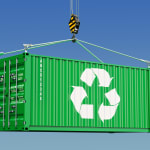
Tom Eng, Senior Vice President and Head of Tomra Recycling, provides an overview of some of the recent changes in European and international waste legislation and highlights the implications of these changes for waste operators.
The global waste and recycling sector is heavily regulated and, in addition to international legislation, almost every country will have its own regulations which waste operators must adhere to. Waste legislation is the backbone of our industry and, for the most part, any changes in legislation are to be welcomed because they are almost always aimed at further improving recycling quality standards or boosting recycling rates – whether at a local, national or international level.
I’d like to take a look at three of the most recent legislative changes that have come into force: the Basel Convention Plastic Waste Amendments, China’s ban on solid waste imports and, briefly, the European Green Deal.
Basel Convention Plastic Waste Amendments
Despite more countries gradually putting in place measures and legislation to recover and recycle plastics, landfilling remains the first option for millions of tonnes of plastics globally. During the Basel Conference which took place in spring 2019, governments agreed to amend the Basel Convention to include plastic waste in a legally-binding framework. 186 countries agreed to this amendment which places new restrictions on the movement of plastic waste that is not destined for environmentally sound recycling. These new restrictions do not apply in the United States.
The amendments came into force on 1st January 2021. Any non-hazardous plastic waste that is not recyclable, or is ‘difficult’ to recycle, is now categorized as waste requiring ‘special consideration’ and its movement is now subject to the Basel Convention prior notice and consent requirements.
The aim of the amendments is to control international shipments of most plastic scrap and waste destined for recycling or disposal, making global trade in plastic waste more transparent and better regulated. The legislation is also intended to stop non-recyclable plastic being ‘hidden’ in recyclable plastic shipments that are being sent to developing countries which have no way of managing this material. Historically, once developing countries have recovered the plastic material they can use, the rest has often ended up in landfills or is simply being put on bonfires.
This new legislation will directly affect waste operators who process household waste because some of the plastics classed as hazardous waste under the Convention are found in household waste streams. As such, in order to export mixed household plastic waste, operators will now have to adhere to a detailed Prior Informed Consent (PIC) procedure, with materials requiring prior consent from both the exporting and importing countries.
The Basel Convention Plastic Waste Amendments will undoubtedly impact on waste operators who currently rely on export markets for their plastic waste. The process of obtaining prior consent could lead to delays of up to several months for exports, and waste operators may find they have to store vast volumes of waste at their plants while they wait to receive their Prior Informed Consent (PIC). If operators fail to comply with the requirement, their material may be returned at the exporter’s own expense. There may be delays in shipment of material if it is stopped during transit and, in some cases, if the requirements are not adhered to, formal action – potentially including financial penalties – may be taken by the authorities in the material’s destination country.
Although most mixed plastics will now require prior informed consent, there are some exceptions. Referred to as ‘Green List’ waste, waste operators will be permitted to continue exporting this material without prior informed consent. Green List waste includes plastics which consist almost exclusively of one type of plastic that are destined for recycling operations, and mixtures of polypropylene (PP), polyethylene (PE), and polyethylene terephthalate (PET) that are destined for separate recycling. All other plastic wastes exports and imports must be notified and receive consent for export prior to movement.
Advances in automated sorting technology are making it possible to achieve exceptional purity results in plastics recycling – from colored and clear types of plastic, such as PET and HDPE, to other polymers like polypropylene, polystyrene and PVC. As long as the right legislation, infrastructure and, in particular, the right combination of sorting technology is in place, it is possible to achieve previously unfeasible purity levels of over 99.99% on single polymer streams.
This material will not only be able to be shipped internationally without prior consent, but it will also command a much higher market price than mixed plastics, so there are both commercial and legislative drivers for separating and sorting mixed plastics into single streams.


